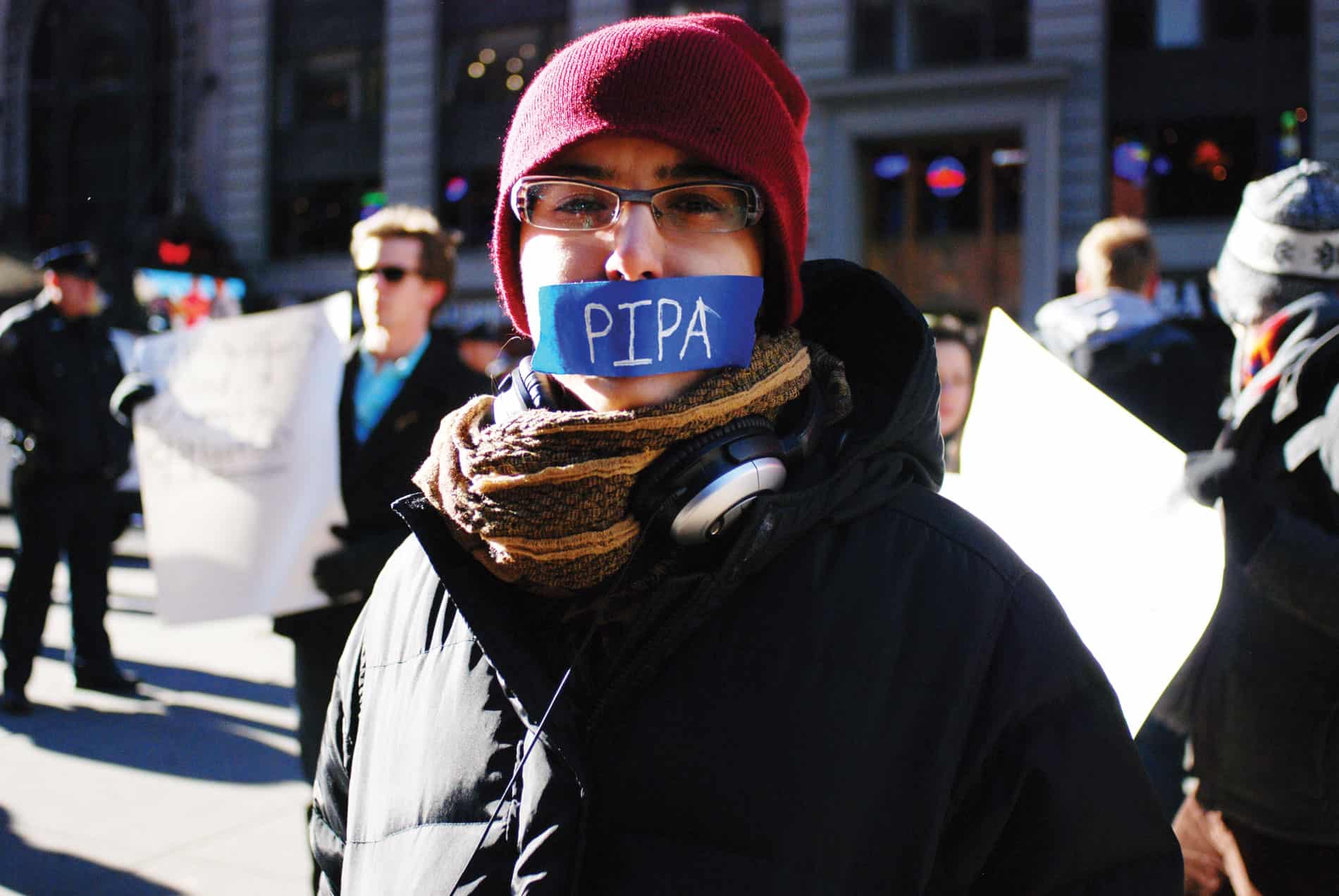The Government’s half-baked effort to modernise anti-piracy laws has led to hazy legislation and prevented vital debate on the issue, writes Rónán Duffy.
The beginning of 2012 has seen the internet community flex its collective muscles on the political stage in a manner not seen before. In the United States, Sopa (Stop Online Piracy Act) and Pipa (Protect IP Act) became the latest political acronyms to enter the American lexicon after the two anti-piracy bills were shelved by legislators. An online campaign to flood the email accounts and telephone lines of politicians responsible for the prospective legislation with objections woke them up to the fact that the issue warranted far more reflection and compromise than they had envisaged. It was also a headline-grabbing victory for internet giants such as Google and Facebook who opposed the legislation and demonstrated the critical part they now play in the US economy, rivalling even perhaps the traditional media in the film and music industries.
The Government here has been at pains to point out that its own anti-piracy legislation, which was presented to the Cabinet at the beginning of February, is nothing like as severe as the indefinitely postponed US laws. That has not stopped over 80,000 people from signing an online petition on the Stop Sopa Ireland website, calling on the Government to abandon its implementation. The draft legislation does differ from its American equivalent in several ways, in particular as it does not contain any provision for search engines to block results for websites deemed to host copyrighted content. There has been widespread opposition to the legislation nonetheless and indeed support for it has been scant apart from on the Government benches and the music industry.
Even if it is accepted that anti-piracy laws here are in need of modernisation, the manner in which it is introduced, by a statutory instrument or ministerial order, has not only led to vague legislation but prevented an informed debate about a sector that will play an increasingly important role in future economic growth.
In a sparsely attended Dáil debate on the legislation, where it appeared the majority of those present seemed more interested in appearing to be relevant by associating themselves with the issue, Minister Seán Sherlock defended the use of the statutory instrument. He argued that it is merely a restatement of what was previously believed to be the legal position and that the State is potentially exposed to being sued for non-compliance with EU law.
Minister Sherlock said that the State has been exposed since November 2010 when a case taken by several Irish record companies against internet service provider (ISP) UPC demonstrated that aspects of a 2002 EU directive have not been adequately provided for in Irish law. The Attorney General’s office, he said, had counselled the Government that this inconsistency needed to be addressed, “The office has advised that the obligation contained in the directive is clear and unambiguous. Rights holders must have a mechanism available to them to apply for an injunction against intermediaries where their intellectual property rights are being breached. Separately, the office advised that the prudent course was to introduce a regulation to ensure compliance.”
The Government was slow to publish the draft of the statutory instrument but since it was made public, many questions have been asked about how it will function in practice as it does not provide any specific details as to what form any injunction granted will take and is also unclear regarding whom it will affect.
UCD law lecturer and chairman of Digital Rights Ireland TJ McIntyre likens the Government’s reaction to a case of the politician’s syllogism, as summed up by Sir Humphrey in Yes, Minister, specifically; “We must do something, this is something, therefore we must do this”.
“Ireland is already a dangerous place to do business for people who host user-generated content,” he argues, “because they are at risk of defamation actions in a way in which they wouldn’t be in other jurisdictions and this means now that potentially they’re at risk of any additional duty which is effectively to police their users in relation to copyright as well.”
The European Court of Justice recently adjudicated that an ISP cannot introduce a blocking or filtering system on its users to prevent copyright infringement and similarly decided that social networking websites cannot be obliged to install a general filtering system. The Government here has welcomed the rulings, indicating that they give additional clarity to Irish courts in deciding on both where the responsibility lies in tackling online piracy and what measures can be legally taken to prevent it. This approach, in essentially forcing the courts to fine-tune the legislation, sets a potentially dangerous precedent as the technical implications of the law may not be fully appreciated until they are implemented.
The Government argues that as well as the EU Charter of Fundamental Rights which protects the freedom of expression and the freedom to conduct a business, the regulation contains an additional proviso aimed at protecting legitimate businesses. The proviso states that the courts “will have due regard to the rights of any person affected by virtue of the grant of any such injunction” – this includes adequate notification of any such injunction application.
Even if an online enterprise feels it has done nothing illegal however, the risk of legal costs involved means that it is very likely the courts will never hear the matter because the defendants simply cannot afford to bring it to the courts. McIntyre believes that the standard instrument is so vague and open-ended that it could actually deter internet intermediaries from setting up shop in Ireland.
The Internet Service Providers Association of Ireland has also contended that the legislation is “vague and overly broad”. They say there is no provision within the legislation to protect internet service providers, who merely provide the technical infrastructure over which information flows. In fact, they say, the legislation does not adequately distinguish between websites whose primary function is to facilitate copyright infringement and profit directly from it, the Megaupload website for example, and legitimate websites where users can share content without the prior knowledge of website administrators.
“What’s most concerning is that intermediaries, and we would argue we’re an intermediary under the law, are essentially being made responsible for the customers or the users on their networks, now that’s incredibly dangerous,” says David Cochrane, founder of discussion forum politics.ie. “As an intermediary, our responsibility doesn’t kick in, in regards to defamation for example, until the offending or potentially offending content is actually brought to our attention. Once it’s brought to our intention, then we have a responsibility to do something about it – if we don’t, then we could be in a bit of trouble.”
There is also a measure of hypocrisy in the Government’s handling of the issue, as last year’s programme for government stated that the use of ministerial orders to enact EU directives “by-passed the checks and balances of parliamentary democracy”.
Also, considering the Government’s recent jobs initiative placed such a vocal emphasis on the development of cloud computing technology, it seems at best a missed opportunity and at worst, irresponsible, not to proceed with a full Oireachtas plenary process to produce primary legislation.
The Government was in fact presented with various other options to consider. An alternative statutory instrument was put forward by independent deputies Stephen Donnelly TD and Catherine Murphy TD.
This included safeguards such as the protection of lawful communications by the requirement for the court to distinguish adequately between infringing material and lawful content. The alternative instrument also aimed to protect small online businesses by making specific provisions to share the cost of compliance with an injunction order.
This would at least rightly acknowledge that is not incumbent on intermediaries to police their users to a degree that could impinge on the freedom of expression. The main opposition parties were light on specifics during the Dáil debate on the instrument, but did express their view that it should go through the full parliamentary process. Minister Sherlock concluded the debate by saying the text would not be changed to include any of the alternative instrument’s suggestions.
At the time of writing, the regulations have not been signed into legislation but a statement from Department of Jobs, Enterprise and Innovation said that an announcement is expected shortly.
It seems therefore that despite the ‘innovation clusters’, the Government is keen to cultivate here and the already invaluable employment already being generated by Google, Facebook et al, the online community here has not yet gained the corresponding amount of political clout.






